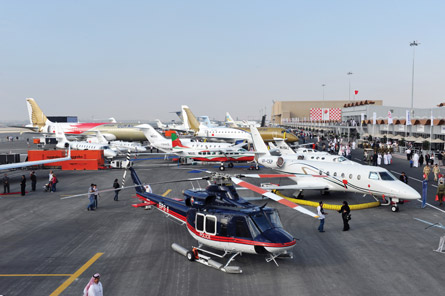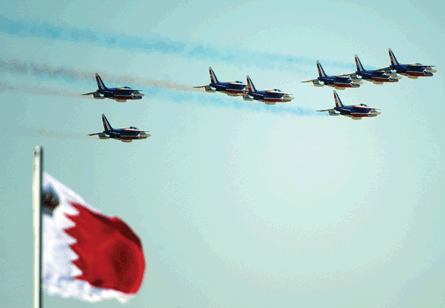When Bahrain's security forces violently put down protests inspired by the Arab Spring last year, it exposed growing ethnic fissures and shook the perception many had of the island as the Gulf's most relaxed, democratic and liberal state. It also dealt a blow to Bahrain's economy, which is highly dependent on banking and tourism. The 2011 motor racing Grand Prix - a huge source of visitors - was cancelled and many business people avoided the country in the aftermath of the conflict.
The second Bahrain International Airshow, held from 19-21 January at the Sakhir air base, provides a platform for the country to rebuild its image. The first air show was held in January 2010, a year before the protests erupted. The organisers - Farnborough International - and the government are determined to reinforce the message of a country on the mend that remains a burgeoning centre for aviation services in the region.
But it will be tricky. Long-time ally and defence supplier the UK - represented at the last show by BAE Systems and Qinetiq among others - is one of the nations that has slapped export restrictions on dealing with Bahrain.
 |
|---|
| © Bahrain International Airshow |
This has affected UK participation at the show, although Farnborough International head of marketing and communications Philippa Ewart points out that "government-to-government relations are still good and invitations have been extended to the UK defence and aerospace community as well as the UK government". The country's industry, she says, will be represented by the ADS trade organisation. "Once this situation changes, we have no doubt that UK companies will return at future editions."
A number of Western exhibitors will be represented, however. They include, from the USA, Boeing, GE Aviation and Lockheed Martin, as well as Cessna and Gulfstream from business aviation. European industry will also be there, with Airbus and Selex Systemi Integrati hosting chalets. As well as Bahrain's own aviation sector - Bahrain Air, Gulf Air, Gulf Technics and MENA will fly the flag - other Arabian exhibitors will also be present. They include Air Arabia, Qatar Airways and TAG Aeronautics.
Although Bahrain itself, with a population of only 1.2 million, has a small defence budget and domestic air transport market, its great advantage is its location, joined by causeway to the Gulf's most powerful nation Saudi Arabia.
The island, with its business-friendly legislation, has traditionally been a conduit for Saudi funds and provides a base for business aviation operations to, and from, its large and wealthy neighbour. Swiss-based Comlux - one of the world's biggest charter providers - runs its Middle Eastern operation from there. Local company MENA is also teaming up with Canadian specialist business jet maintenance, repair and overhaul outfit, GAL, to offer a cabin refurbishment and completion service at the island's airport.
On the airline side, Gulf Air - once the pre-eminent airline in the region - has been fighting off fierce competition from the Gulf's three fast-growing network carriers, Emirates, Etihad Airways and Qatar Airways for the past decade, as well as a host of strong low-cost and regional heavyweights from Flydubai to Royal Jordanian. It even now competes on about a dozen of its routes with a privately-owned, full-service domestic airline, Bahrain Air.
The fall-out from the Arab Spring has thrown its slow recovery plans into reverse for now - the cancelled Grand Prix alone was a disaster in terms of traffic - but the airline, under chief executive Samer Majali, is continuing with its restructuring strategy. This includes a fleet upgrade which is likely to see the airline move its profile away from long-haul and more to smaller narrowbodies and regional jets. Speculation is rife that - with the Canadian airframer in attendance in a big way - the show could see Gulf signing a deal for the Bombardier CSeries.
As part of an earlier restructuring at Gulf Air, its training and maintenance divisions were spun off into independent entities. Although still owned by government investment arm Mumtalakat, Gulf Aviation Academy and Gulf Technics are determined to attract more third-party custom and establish Bahrain as one of the Middle East's main outsourcing centres for crew training and MRO.
The organisers of the three-day air show itself have tried to give it a distinct identity from bigger and more frenetic events such as Dubai. There are no exhibition halls; instead the emphasis is on relaxed face-to-face meetings, with a line of VIP chalets, joined by a corridor and served by a central catering operation.
In addition, there is a static display and air display, which the public can watch from an area on the other side of the runway. The two communities are kept very much apart.
 |
|---|
| © Bahrain International Airshow |
Ewart describes the Bahrain air show as a "focused business-to-business event" which provides "an opportunity for buyers and suppliers to engage in high-level networking and meetings with VIP delegations".
While the plans are to grow the event, Ewart insists it will not lose its "core brand values" of "exclusivity and privacy". She insists: "We are not looking to simply expand our exhibitor numbers - other shows may boast they host over 800 exhibitors, for example, but the numbers game is simply not a format we wish to follow."
Source: Flight International




















